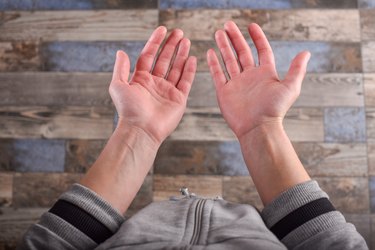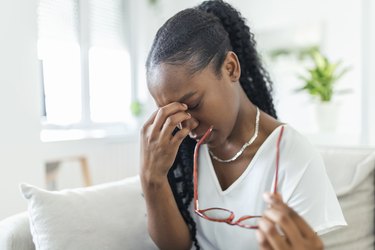
Many of us get a little pink in the face when we're angry or embarrassed. But hot, red cheeks aren't always triggered by unpleasant emotions. Sometimes, flushed face causes are physiological.
Facial flushing happens when the tiny blood vessels under the skin of the face become dilated. "The widening of the blood vessels causes increased blood flow, creating the appearance of redness or flushing," explains Vladyslava Doktor, DO, dermatologist and owner of Skin Center Boston in Massachusetts.
Video of the Day
Video of the Day
Flushing can have a number of possible triggers, most of which aren't cause for major concern, Dr. Doktor explains. Here's a look at some of the most common culprits and what you can do to ease the burn.
1. You Have Rosacea
Rosacea, a skin disease that causes facial skin to blush or flush easily, is one of the most frequent causes of flushing, Dr. Doktor says.
Rosacea can flare from sun exposure, alcohol, certain foods, hot drinks or stress, often starting around the nose and cheeks and spreading outward, notes the American Academy of Dermatology (AAD).
Fix it: See a dermatologist if you suspect your flushed face is caused by rosacea. While there's no cure, the problem can usually be managed by avoiding triggers and sticking with a mild skin-care routine, the AAD says. Laser treatments can help reduce redness, too.
2. You're Having Hot Flashes
Hot flashes — one of the most common side effects of menopause — can cause a sudden feeling of warmth around the face and neck along with blotchiness, sweating, a fast heartbeat and feelings of anxiety, according to the Mayo Clinic. They tend to come on suddenly and fade within a few minutes.
Fix it: Lifestyle changes like dressing in layers, avoiding overheating, using a fan, drinking cold drinks and even losing weight are among the best natural remedies for hot flashes, the Cleveland Clinic notes. You can also talk with your doctor about medications like hormone therapy, antidepressants or anti-seizure drugs that may help.
3. You Ate Something Spicy
Capsaicin, the compound that gives hot peppers their punch, can make your face (and body) feel hot and flushed when you eat it. Sometimes it can make your eyes tear or your nose run too, notes DermNet NZ. (Which could be helpful if you've got a stuffy nose.)
Fix it: It's normal to get a flushed face when you eat something spicy. But if it makes you uncomfortable, your best bet is to simply steer clear of eating hot peppers, says Marisa Garshick, MD, assistant clinical professor of dermatology at Cornell-New York Presbyterian Medical Center.
4. You Started a New Med
Several types of prescription drugs can cause facial flushing as a side effect, Dr. Doktor says. High blood pressure medications like vasodilators and calcium channel blockers are some of the most common offenders because they work by relaxing blood vessels to increase blood flow. But they're not the only ones.
These other meds or supplements can also make your face flush:
- Anti-androgen medications, used to manage prostate cancer and PCOS, among other conditions
- Bromocriptine, used to treat infertility or certain menstrual problems
- Cholinergics, often give to people with Alzheimer's disease, glaucoma and urinary retention
- Immunosuppressants
- Iron supplements (in very high doses)
- Niacin (vitamin B3)
- Morphine
- Steroids
- Tamoxifen, which treats certain types of breast cancer
- Thyroid medications
Fix it: Let your doctor know if a medication or supplement is making your face red. Together, you can determine whether your prescription needs to be adjusted.
5. You're Sensitive to Alcohol
If drinking tends to make your cheeks red and warm, you're not alone. It's a common flushing trigger, Dr. Doktor points out. For some people, alcohol can cause the release of the compound histamine, which can make your face flush, according to the National Institute on Alcohol Abuse and Alcoholism (NIAAA).
Fix it: If you're prone to facial flushing from alcohol, the only way to reduce or avoid it is to drink less or not drink at all, the NIAAA says. Avoid taking antihistamines (like Benadryl) or other OTC meds to manage the problem. They won't stop the redness and can actually make it harder for your body to metabolize the alcohol.
6. You Have a Food Sensitivity
Some foods contain compounds that can trigger flushing, Dr. Doktor says. Some of the most common offenders that can cause flushed cheeks include:
- Nitrates, found in cured meats like bacon, salami, ham and hot dogs. Sometimes the flushing is accompanied by a headache.
- Sulfites, found in dried fruit, bottled soft drinks and fruit juices, cider, beer, wine, pickles and other packaged foods. Sometimes the flushing is accompanied by wheezing.
Fix it: You'll need to avoid trigger foods that make your face flush or cause other symptoms. See your doctor if you're having trouble pinpointing which foods are the problems or if you're having trouble cutting them out of your diet.
7. You Have a Gluten Intolerance
Consuming gluten — the protein found in wheat, barley and rye — could make your face warm and red if you have a gluten intolerance.
"It can lead to flushing as a result of inflammation triggered by allergenic pathways," Dr. Doktor explains.
Other common symptoms can include abdominal pain, gas or bloating, fatigue, headache and nausea or vomiting, the Cleveland Clinic notes.
Fix it: The best way to keep symptoms including flushed cheeks at bay is by following a gluten-free diet. Probiotics might help with relieving symptoms like gas or bloating, the Cleveland Clinic notes, but they likely won't improve facial flushing.
When to See a Doctor for Facial Flushing
Flushing that eases up with lifestyle changes (like avoiding triggers) isn't usually something to worry about. But you should let your doctor know if you're having trouble managing the problem, it's happening frequently, you're not sure what's causing it or if the flushing is accompanied by sweating, diarrhea or wheezing or coughing, Dr. Doktor says. In some cases, the redness could be caused by a more serious underlying problem like a neurologic disorder or an autoimmune disease.
Is this an emergency? If you are experiencing serious medical symptoms, please see the National Library of Medicine’s list of signs you need emergency medical attention or call 911.


